Gravity Roller Conveyor: Efficient Material Handling Solution
As material handling operations continue to evolve, businesses are under increasing pressure to move goods faster while controlling costs and improving operational efficiency. In this environment, selecting the right conveyor system plays a critical role in maintaining smooth and reliable workflows.
A gravity roller conveyor offers a practical solution by enabling products to move using gravity or manual force, without relying on motors or electrical power. Its simple design supports consistent material flow, reduces energy consumption, and minimizes maintenance demands. As a result, gravity roller conveyor systems are widely adopted in warehouses and industrial facilities seeking efficiency, flexibility, and long-term value.
What Is a Gravity Roller Conveyor?
A gravity roller conveyor is a non-powered material handling system that uses cylindrical rollers mounted in a frame to move goods using gravity or manual force. Products travel along the conveyor due to a slight incline or by being pushed by operators, eliminating the need for motors or electrical components. This system is commonly used for cartons, totes, and pallets with flat, rigid bottoms. Because of its simple mechanical design, a gravity roller conveyor offers excellent reliability, low operating costs, and easy integration into existing material handling layouts, making it a popular choice across many industries.
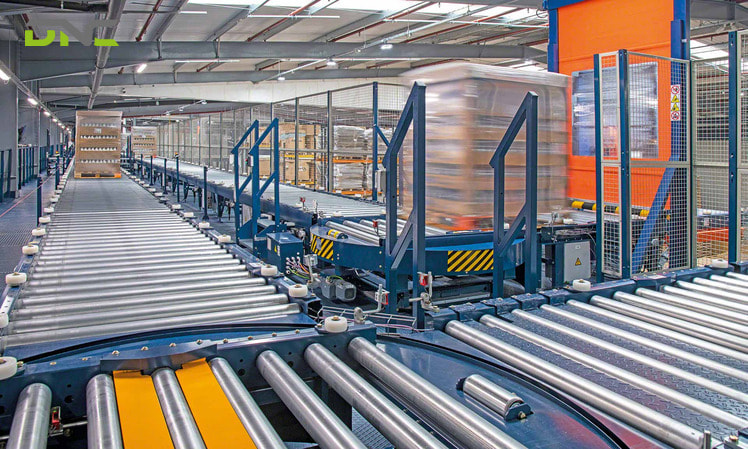
What Is a Gravity Roller Conveyor?
Gravity Conveyor Specifications
Gravity conveyor specifications may vary depending on the application and specific requirements of each company. Here are some basic specifications:
- Roller size: 20mm – 100mm (depending on the weight and size of the goods to be transported)
- Conveyor size: 3m x 12m (Width x length), can be designed according to requirements
- Material: Galvanized steel or black steel, Stainless steel 304 or 316 (for food and pharmaceutical industries)
- Maximum load per roller: 50kg – 200kg depending on the size and material of the roller.
- Total load of conveyor belt: 500kg – 1000kg/m (or more depending on requirements)
- Normal tilt angle: 5° – 10° (depending on the type of goods and production requirements)
- Travel speed: 0.5m/s – 1.5m/s.
- Warranty: 12 months
How Does a Gravity Roller Conveyor Work?
Gravity roller conveyor systems rely on basic physical principles to transport goods efficiently. Although the mechanism is simple, proper design ensures smooth and controlled product movement throughout the workflow.
- Gravity-driven movement: Products move along the rollers due to a slight decline angle. The incline must be carefully calculated to ensure steady motion without excessive speed or product impact.
- Manual assistance when needed: In flat configurations, operators can push items manually. This allows controlled movement in packing, inspection, or order consolidation areas.
- Consistent roller spacing: Rollers are spaced to support the load evenly. Proper spacing prevents sagging, tipping, or product instability during transport.
Key Components of a Gravity Roller Conveyor System
Although it is non-powered, a gravity roller conveyor consists of several essential components that determine performance and durability.
- Conveyor rollers: Rollers are typically made from steel, stainless steel, or PVC. The choice depends on load capacity, environmental conditions, and product type.
- Frame structure: The frame supports the rollers and load. Steel frames provide high strength for heavy-duty applications, while aluminum frames offer lightweight flexibility.
- Axles and bearings: Bearings allow smooth roller rotation and reduce friction. Quality bearings are crucial for maintaining consistent flow and reducing manual effort.
- Supports and legs: Adjustable legs help set the correct conveyor height and incline, ensuring ergonomic operation and proper product movement.
How many types of gravity conveyors are there?
Gravity Conveyors are classified based on two main criteria: conveying surface and design structure. Choosing the right type for your operating needs will help optimize the efficiency and life of the system.
By conveying surface
- Roller type: This is the most common type, using parallel roller tubes to transport goods. Roller conveyors are suitable for products with flat bottoms such as cartons, pallets or trays.
- Sliding wheel type: Uses small wheels, usually made of plastic or metal, mounted in rows for goods to slide on the surface. This type is lighter than roller conveyors and is often used to move light, small objects. The ability to change direction flexibly is a big advantage of this type of conveyor.
By structure
- Fixed conveyor: This is a conveyor system installed at a fixed location, often used in production lines or fixed goods circulation areas. Sturdy construction, suitable for long-term applications.
- Mobile, foldable conveyor: Flexible design with foldable ability, easy to move with wheels, saving space and convenient when changing the layout of the working area. This is an ideal choice for factories that need mobility or temporary during operation.
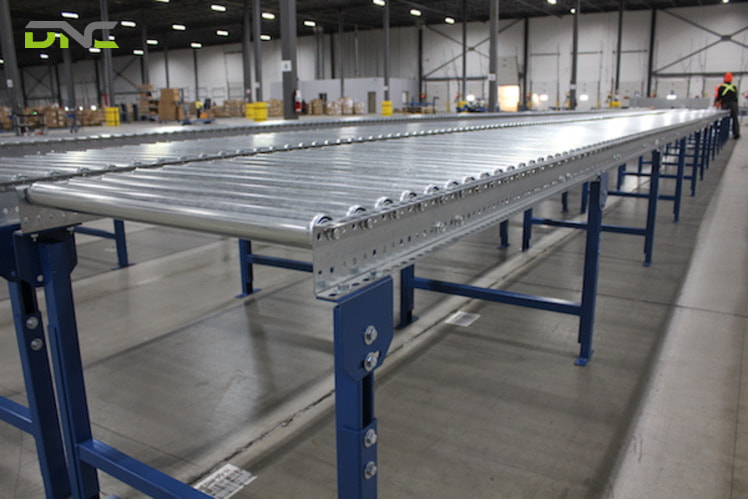
Gravity Conveyors are classified based on two main criteria: conveying surface and design structure.
Why should businesses choose to use Gravity Conveyor?
In the context of businesses increasingly focusing on optimizing costs and simplifying production processes, gravity conveyor stands out as an effective solution with a reasonable investment level. Below are the outstanding advantages that make this type of conveyor a popular choice in many factories today:
- Increased productivity: Thanks to the continuous and natural operation mechanism along the slope, the system helps to minimize manual operations such as lifting – lowering – pushing goods. Workers do not need to move much, thereby saving time and increasing the efficiency of handling goods per shift.
- Energy saving: Gravity conveyor does not use motors or electricity, helping to minimize monthly operating costs – a significant advantage in industrial environments that consume a lot of electricity.
- Low investment cost: Compared to conveyors using motors, gravity conveyor systems have a simpler structure, leading to significantly lower installation and maintenance costs.
- Easy to install and maintain: The simple design makes assembly and disassembly quick. In addition, the maintenance process does not require high technology or complicated spare parts.
- Smooth, safe operation: Due to the lack of moving parts, the system operates smoothly, with little noise, while minimizing the risk of electrical or mechanical damage.
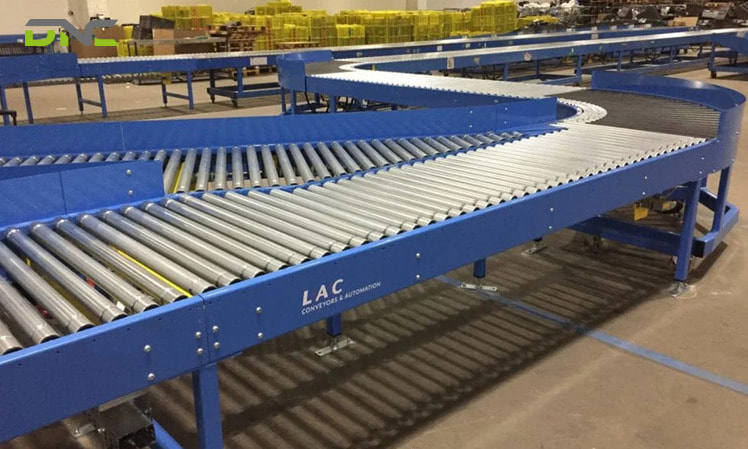
Benefits of Gravity Conveyor
In which industries is Gravity Conveyor applied?
With the ability to transport goods efficiently without electricity, gravity conveyors are widely used in many industrial fields, especially in production environments that need to optimize costs and space. Here are some typical industries:
- Food & beverage industry: Used to transport cartons, bottles, packaging or boxes from the production area to packaging and storage.
- Logistics and warehousing industry: Gravity conveyor systems are often installed in distribution centers, import and export areas to help move cartons, packages or pallets without forklifts or automatic conveyors.
- Textile & footwear industry: Supports the transportation of semi-finished products such as fabric bundles, product boxes or auxiliary supplies from the cutting – sewing area to the finishing and packaging area.
- Automotive & mechanical engineering industry: Used to move components, tools or mechanical parts of moderate weight in production lines or quality control.
- Electronic components manufacturing industry: Used to transfer trays containing small components between stages in the production line. With the advantage of no shaking and easy control, gravity conveyor helps protect components from damage during movement.
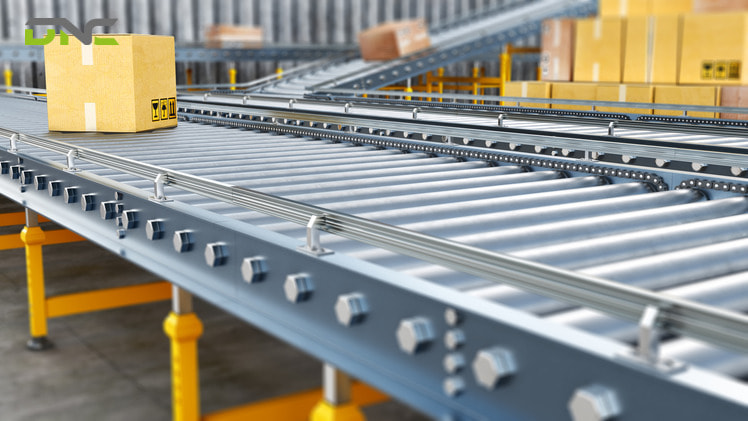
Gravity conveyors are widely used in many industrial fields
Is Gravity Conveyor expensive or cheap?
The price of a gravity conveyor usually varies depending on factors such as the type of conveyor (roller or slide wheel), the material used (steel, stainless steel, plastic), as well as the length and design (fixed or mobile). Currently, the price of a Gravity Conveyor ranges from $10,000 – $30,000
Prices vary between suppliers, depending on factors such as material quality, design customization, and after-sales service. To get the most accurate and suitable quote, you should contact reputable suppliers to receive a quote based on your specific requirements.
Gravity Roller Conveyor vs Powered Roller Conveyor
Choosing between a gravity roller conveyor and a powered roller conveyor depends on operational requirements, budget, and the level of control needed within the material handling process. The comparison below highlights the key differences to help identify the most suitable solution for each application.
| Criteria | Gravity Roller Conveyor | Powered Roller Conveyor |
| Power source | Non-powered; relies on gravity or manual force | Motor-driven with electrical power |
| Operating cost | Very low, no energy consumption | Higher due to electricity and controls |
| Maintenance | Minimal, fewer mechanical components | Requires regular motor and control maintenance |
| Speed control | Limited, controlled by incline and load | Precise speed and flow control |
| System complexity | Simple design, easy to install | More complex with sensors and drives |
| Best use cases | Manual handling areas, simple transport lines | High-throughput, automated operations |
Why Choose a Gravity Roller Conveyor Partner Like DNC Automation?
If you are uncertain about where to purchase a wheel conveyor, DNC Automation is an excellent option for you. Many customers have trusted DNC to provide automation solutions in the production process and have had positive experiences because:
- DNC is a leading technology, automation, and engineering company in Malaysia with over 15 years of experience in the field of automation
- System integration machinery, Internet of Things (IoT), Industry 4.0, and WinCC Scada System
- Diverse designs and sizes are suitable for many domestic and foreign houses. The equipment is 100% genuine and imported from Malaysia.
Please contact us via the hotline below if you have any questions about the product, we are happy to answer you!
- 20 views
- 0 Comment



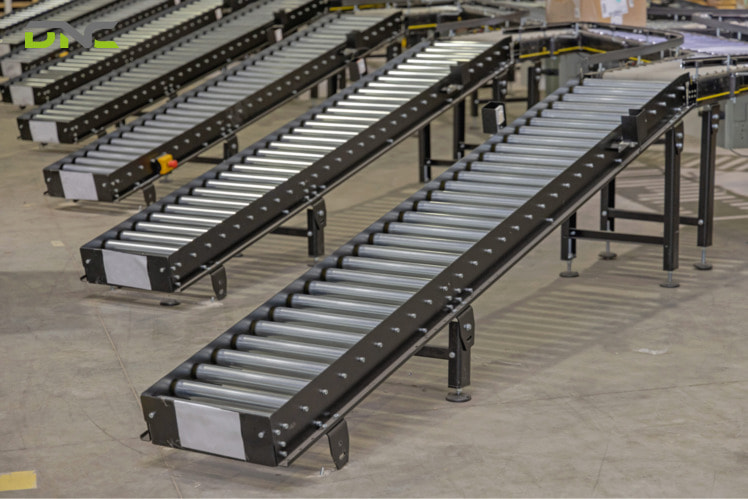
Recent Comments